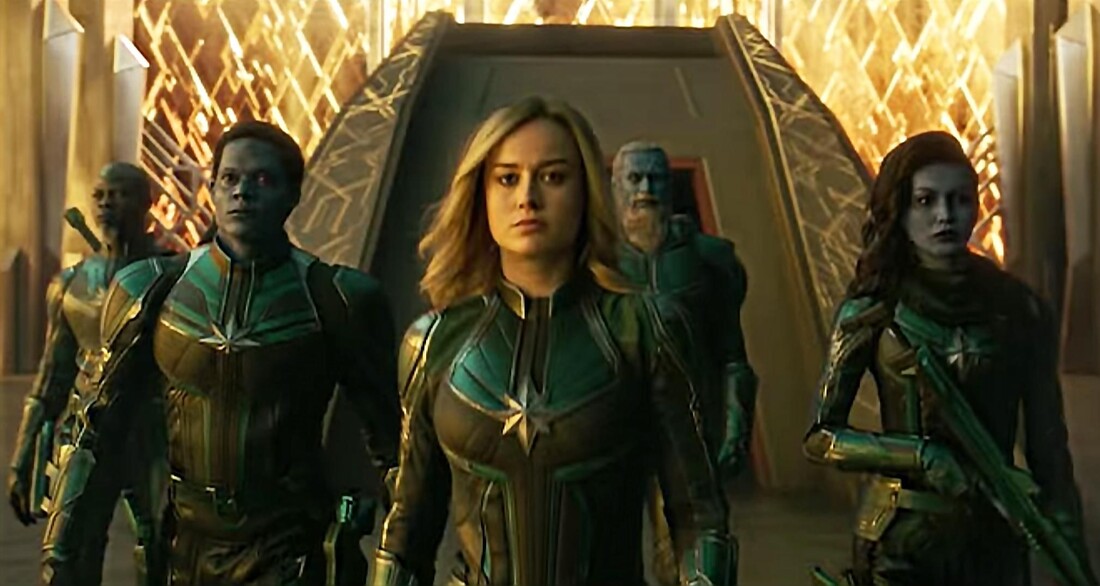Larson and Jackson, separated by decades, form a strong buddy duo as they travel from secret air base to secret air base. He seems invigorated by the de-aging and plays Fury with none of the gruffness that he otherwise brings to the character’s older version. The Nick Fury who’s badgering Spider-Man wouldn’t have the rapport that this version has with a scene-stealing calico cat. Jackson spends most of the film bouncing off Larson’s straight woman, and she plays it very straight. Not only is she absorbing Fury’s jokes and asides, she’s also the most dour and serious protagonist thus far in the MCU, free of leavening qualities like Steve Rogers’ aw-shucks earnestness or the deep bench of contrasting characters that plays off of Black Panther. The decision to make the franchise’s first female lead a step away from humorlessness is not Captain Marvel’s fault exactly, but the choice places the character closer to Zach Snyder-style smoldering than Marvel’s extensive cast of goof-em-ups. The film stresses the long military background of the character to justify her demeanor, and the take is certainly a new one for the MCU, but as far as introductions go, it’s not particularly endearing. Larson’s brief appearance in Avengers: Endgame indicates the studio hasn’t figured out a way to integrate her beyond a glowering, focused competence that showcases little of the raw humanity that Larson has proven so adept at.
With Vers’ iron will driving the film ever forward, directors Anna Boden and Ryan Fleck take some time finding their comfort zone. The combined four budgets of their quiet character studies like Sugar and Mississippi Grind total less than a tenth of Captain Marvel’s budget, and grossed an even smaller number. Beyond money, what exactly drew them to this property or Marvel to them is something of a mystery, and the result abides by the sameness that afflicts much of the MCU. The one outlier is a quieter sequence in a Louisiana bayou that feels like a breath being taken by the audience and the directors themselves. Free of ostentatious CGI (Jackson remains de-aged here) and dedicated to working out the decisions that will drive the final act, the scenes are just as much an oasis for Boden and Fleck as they are for the characters. There’s never going to be a superhero movie that exists on so small a scale, but the directing duo become so comfortable here that all the jargon and space nouns even start to sound natural.
Marvel’s been smuggling in higher-minded poli-sci messages since Avengers: Age of Ultron, and it’s something that’s elevated the franchise into something more meaningful than a vehicle for Asgardians and Groots. Working from a script by Boden, Fleck, MCU vet Nicole Perlman, Pixar vet Meg LeFauve, and newcomer Geneva Robertson-Dworet, the same applies to Captain Marvel both on an individual and global scale. The conflict between the Skrulls and the Kree is developed to resemble real historical disputes, though to say what kind would be a spoiler. On an individual level, Vers can readily stand in for overt and covert forms of misogyny, experiencing both rank exclusion based on her gender and head-patting condescension. There’s a synchronous, compact build that the writers have layered into the script, but while it’s impressive to think about, the actual moment turns out not to be as powerful as it should. Captain Marvel knows that it needs to bring something different to its origin story. It succeeds in going deeper than something like Doctor Strange or Ant-Man, but then there’s that joyless tone again.
Disney and the MCU have figured out how to avoid making a bad film with their superhero franchise, and it’s hard to imagine anyone hating Captain Marvel. There’s enough here to entertain and to consider, but at this point, one wonders if there shouldn’t be a new name for whatever this kind of medium is. How can Part XXI not be weighed against everything earlier? Captain Marvel represents a further broadening of the MCU’s scope, but its lead feels out of place amongst her franchise co-stars and its directors are only comfortable around farmhouses and tall grass. Larson plays a character who could rip the Guardians of the Galaxy to pieces, but there’s no question which I would rather see back on cinema screens. C

 RSS Feed
RSS Feed